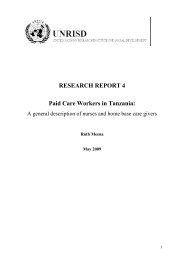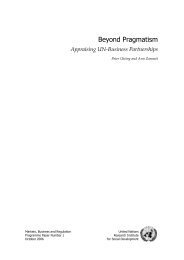Environmental Degradation and Social Integration - United Nations ...
Environmental Degradation and Social Integration - United Nations ...
Environmental Degradation and Social Integration - United Nations ...
Create successful ePaper yourself
Turn your PDF publications into a flip-book with our unique Google optimized e-Paper software.
Third, a range of tax, pricing <strong>and</strong> accounting-based policies has been implemented or proposed<br />
with the intention of creating incentives for behaviour that is positive or neutral for the<br />
environment, <strong>and</strong> creating disincentives for environmentally destructive behaviour. Often, although<br />
not always, such market-based policy proposals define their goals in terms of balancing the tradeoffs<br />
between human activity <strong>and</strong> environmental conditions in order to achieve maximum economic<br />
efficiency. These three approaches, then, can be broadly distinguished as “environmentalism for<br />
nature”, “environmentalism for people”, <strong>and</strong> “environmentalism for profits”. 18<br />
Conservationism<br />
The idea that human activity is detrimental to the natural environment, <strong>and</strong> that nature should be<br />
conserved by keeping areas free from human contact, has been influencing environmental policy<br />
since at least the mid-nineteenth century, when the first national parks were established in the<br />
<strong>United</strong> States. Similar protected areas were subsequently set up in other regions, with a marked<br />
growth in the number of national parks <strong>and</strong> protected areas created since 1950. With adequate<br />
maintenance <strong>and</strong> support, protected areas can be very successful in preserving ecosystems that<br />
would otherwise be threatened with disruption. However, when the needs of people residing in<br />
areas to be “conserved” are not acknowledged, the human costs of this kind of environmental<br />
protection can be unacceptably high (see box 6).<br />
Nature conservation may also take the form of regulations limiting or prohibiting the exploitation<br />
of certain animal or plant species, m<strong>and</strong>ating environmental protection measures to be carried out<br />
in conjunction with productive activities (for instance, requiring small farmers to undertake soil<br />
conservation activities) or prohibiting various activities that contribute to air, water or soil<br />
pollution. Such conservation policies can, in some circumstances, make a significant contribution<br />
to environmental health. In developed countries especially, environmental decline has often been<br />
halted or reversed through the implementation of conservation measures.<br />
However, the accomplishments of the conservation approach, especially in developing countries,<br />
have been limited by what has been called the problem of “coherency”. 19 All too often,<br />
contradictory policies are implemented: governments simultaneously promote conservation <strong>and</strong><br />
environmental degradation, <strong>and</strong> the result is “one step forward <strong>and</strong> two steps back”. At the local<br />
level, attempts to promote rural conservation works have been hampered by lack of time, materials<br />
<strong>and</strong> resources on the part of the local people, who are usually the ones expected to carry out such<br />
work. At the national level, the failure to integrate environmental policies <strong>and</strong> programmes with<br />
broader development questions is particularly evident. <strong>Environmental</strong> protection strategies must go<br />
h<strong>and</strong> in h<strong>and</strong> with development strategies that attempt to transform the specific patterns of<br />
accumulation <strong>and</strong> human settlement underpinning environmental degradation—notably certain<br />
forms of agricultural expansion, infrastructural development, l<strong>and</strong> concentration <strong>and</strong> the<br />
colonization of agrarian frontier areas.<br />
At the international level, the contradiction between conservation initiatives <strong>and</strong> other policy<br />
proposals is even more pronounced. <strong>Nations</strong> are being urged by the international community to put<br />
their ecological house in order, yet they have also come under tremendous pressure to slash<br />
government spending <strong>and</strong> credit, seriously curtailing the effectiveness of environmental <strong>and</strong><br />
extension agencies. In addition, the requirements of many structural adjustment programmes<br />
encouraging the rapid growth of agro-export agriculture have also had negative environmental<br />
effects. The implementation of such programmes has led, in some cases, to increased deforestation<br />
<strong>and</strong> the use of agrochemicals, to the destruction of certain peasant farming systems that had<br />
historically yielded important environmental, social <strong>and</strong> cultural benefits, <strong>and</strong> to the displacement<br />
of small producers to more ecologically fragile areas.
















